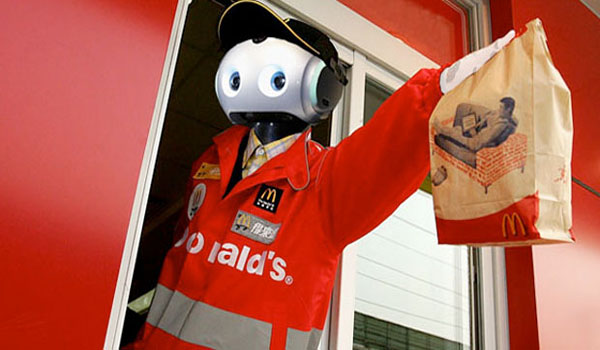
Robots Are Starting To Take Over Fast Food Jobs
Truther
of benefits. But a new trend suggests that they may face competition that doesn’t care what hours they work, or what they’re paid.
Fast food chains in Japan, China and Great Britain have begun piloting the use of robots to cook meals. And while robots have been emerging in recent years as a boon for completing menial tasks like dispensing medicines in hospitals, these fast food robots are capable of preparing full sushi rolls or noodle dishes for Asian food outlets. In many cases, customers complete their orders through a touchscreen, which then alerts the robot how to prepare the meal. No humans needed.
It stands to reason that American fast food companies will adopt the robots at some point. One new fast food robot is the noodle-slicing “Chef Cui” in China, which as the Associated Press reports, costs restauranteurs 30,000 Chinese Yuan to buy, or $2,000. Comparatively, a human noodle chef is paid about $4,700 a year in China, according to the AP.
For Liu Maohu, a noodle restaurant owner in Beijing, the choice of hiring a robot over a human is easy. “The robot chef can slice noodles better than human chefs,” he told the AP. “And it is much cheaper than a real human chef.”
This is just the beginning, too. A report by the McKinsey & Company consulting group says that robots will occupy about one out of every eight commercial service jobs by 2025. And for fields like manufacturing, packing, construction and maintenance, the figure is roughly one in four. To reach those numbers, companies will have to invest roughly $1.4 trillion, according to McKinsey.
Robots work on farms
Robots also are being used in the agricultural process. A group of dairy farmers in NY are using European-made robots and putting them to work milking herds. And as the Associated Press recently reported, robots are entering the “last frontier of agricultural mechanization” — fruit and vegetable field work. Previously, robots were not used for such work, because they weren’t sensitive enough with the produce, which led to undesired bruising. The new robots, referred to by names like Lettuce Bot, are now endowed with advanced sensors and high-precision GPS location technologies to ensure the food isn’t damaged.
What will that mean for fast food workers?
In the past year, workers have walked out on their job in seven cities, demanding that their wages — they usually earn salaries close to the federal minimum wage of $7.25 an hour — be doubled to $15 an hour. “The saddest thing about this story is that probably ten years from now robots will replace human beings… and low skill workers will have really no place to go,” John Curley, a radio host for KIRO-Radio in Seattle, said during a recent report, which looked back on one of the fast food protests that took place in his hometown.
In an e-mail to AOL Jobs, Hudson Riehle, a vice president for the National Restaurant Association (NRA), the fast food trade association, says robots won’t “replace the human factor” in the industry. He said a “personal touch” is “essential” throughout the industry. Indeed the NRA projects the industry to continue growing over the next decade and add roughly a million new workers by 2023. Currently, there are 13.1 fast food workers in America, according to the NRA.
Yet on his show Curley raised examples where robots were already replacing workers. To back up his claim, he pointed to McDonald’s and the Japanese sushi chain, Kura. As he shared on his show, McDonald’s just installed 7,000 touch-screens throughout Europe, eliminating the need for workers to take customers’ orders. Kura, for its part, has been able to fully eliminate cashiers from their workflow. In their place, the chain has installed scales in their branches that customers use to weigh their food. The customers are then asked to leave the money in a bucket, as if it were a highway toll.
A San Francisco company, called Momentum Machines, already has created a robotic assembly line that can assemble 360 hamburgers an hour. The company says the device could save fast food outlets $135,000 a year in labor costs, according to Digital Trends.
VIEW VIDEO

